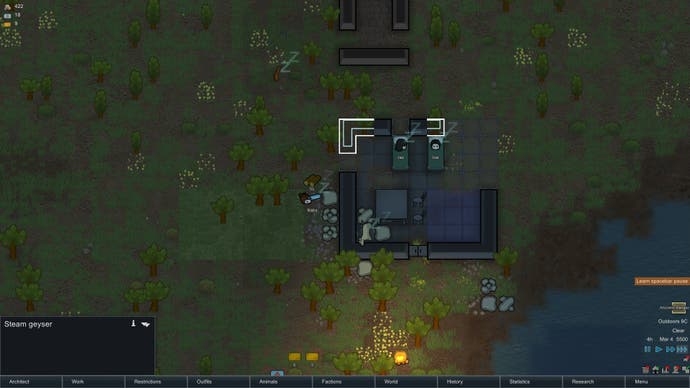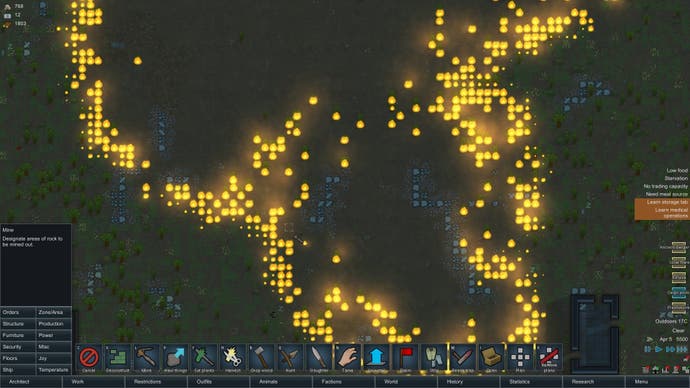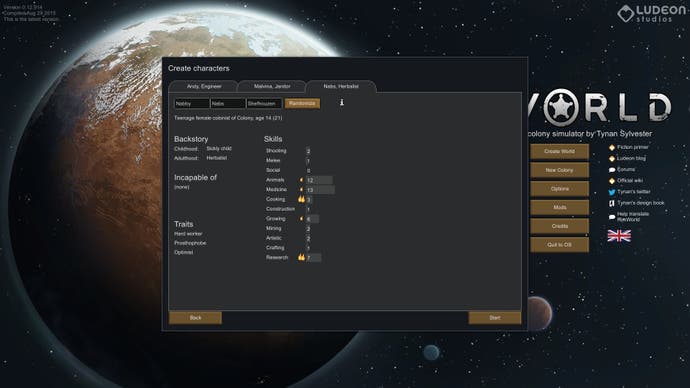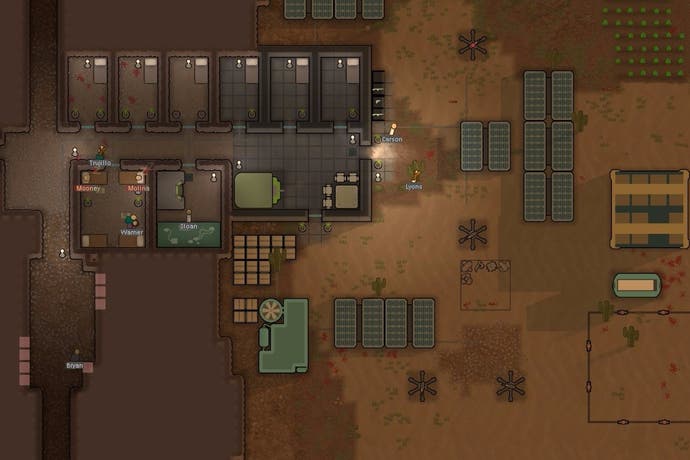RimWorld: Can you make your game up as you go along?
When the emergent are themselves emerging. Ooo, meta.
Whether you call it "emergent gameplay," "emergent narrative," or simply "emergence," the idea of undirected and even unforeseen events happening in a video game has always been something of a holy grail for a certain flavour of designer. The idea behind this ideal is that your game, almost always something of a sandbox in its nature, has all the ingredients required to constantly cook up original, spontaneous and unplanned events. It can endlessly recombine its many elements to produce new surprises and new situations.
The player doesn't know what will happen next, where the next challenge or threat will come from, perhaps finding that an element overlooked or insignificant in one game is absolutely critical during the next. Things should develop organically, but should always make sense. You can't have emergence without coherence.
But what if it wasn't just the events in your game that were unpredictable, but its development? What if you didn't know exactly how it was going to grow next, where its design might take you? That's how RimWorld designer Tynan Sylvester sees his work, as he develops his ever more complex sci-fi colony simulator. And, he adds, it's a far better practice than others he has seen.
"I've seen a lot of tragic game development processes where someone has a game that they're committed to, they keep working on it and working on it, but it's just not very engaging," he explains, over a Skype call. "To me, the diagnosis is almost always the same. They're not necessarily doing bad work, but it's wrapped around something that just doesn't spark."

While RimWorld is a game of many, many moving parts, with its distinct and individual colonists, resources, objects and crafting, Sylvester says that it grew from one such "spark." He began its development by distilling down to a seed of an idea that he has been slowly growing since.
"Part of my design philosophy is really trying to find the the essential core," he says. "I think you can reduce most things out of a game and come down to something that's really compelling, just at the centre of it. One collection of mechanics or one single mechanic. I wanted to do that first and then build up around it. I think that core is really what makes the difference between a good game and a bad game."
It's difficult now to imagine a distilled RimWorld. It's dense with ideas and, should you still be unsatisfied, there's an impressive collection of mods that add even more to the game. Beginning with a handful of stranded, would-be colonists, each of whom has their own skills and personality traits (anything from optimist to cannibal to nudist), the game constantly introduces random challenges. These can be anything from raider or pirate attacks to disease or lost refugees. It's more than enough for a tiny team of marooned humans to handle, particularly when they're already struggling with day-to-day survival, mining for resources, scavenging for supplies and hunting for dinner.
As you might expect, Sylvester cites Dwarf Fortress as a muse, placing RimWorld amongst the many other games inspired by this complex and still-growing subterranean simulation. Much like Dwarf Fortress, Rimworld is also growing feature by feature, that growth careful and deliberate. It's a story we're very familiar with by now, one of a successful Kickstarter campaign, of being Greenlit on Steam and of several years of slow, gradual development at the hands of a single person.

"I quit Irrational Games in early 2012," Sylvester says. "Through that summer, I worked on my book [Designing Games], then I started working on game prototypes. I guess that's when you can say I started on RimWorld. I began with a series of prototypes, just looking for a game concept. I think I went through five or six of those and it coalesced into a colony simulator around February 2013. About three or four months later it actually became functional. I knew that because I had three or four friends test it. I thought it'd just be a twenty minute thing, but I couldn't get them to stop playing. It was like 1am before they went home."
Also, much like Dwarf Fortress, RimWorld is largely the work of just one person, though Sylvester says he's "slowly learning to delegate" and has help with some of the art and sound. Nevertheless, he's an advocate for working solo, because it's both less complicated and more liberating.
"There's a lot of efficiencies when you work by yourself," he says. "You know what you're doing and you can go from task to task. People talk of teamwork, but there's tremendous benefits to working solitaire. You don't have to spend any time communicating. I got into this to make games, not to manage some big team."
Nor is Sylvester in any hurry. Not only is he able to take his game where he wants, when he wants and how he wants. Doubtless, there are some project managers who would be tearing their hair out to hear this, but he doesn't know quite what's next and he's not rushing to find out. He's happy to experiment with new ideas to see what works and, if that means discarding a few, or a lot, that's just fine.

"I really believe that it's a bad idea for a game developer to try to plan something months or years into the future," is his philosophy. "An advantage for indie devs is you don't have these marketing plans with thousands of people working on them. Your advantage is that you can be nimble and I play that to the hilt. I basically don't tell anyone what's coming up because usually I'm wrong. Usually something gets implemented, you play around with it and it doesn't work the way that you predict. And usually, when something great happens in game design, it's not some spark of genius that someone saw ahead of time. It's an opportunity that came up and that was grabbed."
This means Sylvester isn't so much hesitant to say exactly how RimWorld will develop, more that he just doesn't know. "I'm not promising anything in particular. I hate to promise specifics," he tells me. "That said, I do have a giant Google Doc with hundreds of ideas, from game systems to characters, plants, weapons." Some of these may make it in. Others may be tried and discarded. Sylvester is happy to let RimWorld grow organically, much like its many own emergent events, and doesn't mind making things up as he goes along. Nor does he have a timeframe for when the game will be finished, or even a picture of what that finished game looks like.
Does it matter? Not particularly. Sylvester is certainly happy working the way that he does, while RimWorld's growing audience are never short of tales to tell courtesy of that emergence they so love. RimWorld is already a fascinating and complex game, only made even more curious by nobody quite knowing where it will go next.

